Alfa Romeo Junior vs Skoda Kodiaq – Differences & prices compared
Compare performance, boot capacity, efficiency and price at a glance.
Find out which car is the better choice for you – Alfa Romeo Junior or Skoda Kodiaq?
Costs and Efficiency:
Looking at overall running costs, both models reveal some interesting differences in everyday economy.
Alfa Romeo Junior has a decisively advantage in terms of price – it starts at 25700 £, while the Skoda Kodiaq costs 36800 £. That’s a price difference of around 11177 £.
Fuel consumption also shows a difference: Skoda Kodiaq manages with 0.40 L and is therefore significantly more efficient than the Alfa Romeo Junior with 4.80 L. The difference is about 4.40 L per 100 km.
As for range, the Alfa Romeo Junior performs convincingly better – achieving up to 410 km, about 287 km more than the Skoda Kodiaq.
Engine and Performance:
Under the bonnet, it becomes clear which model is tuned for sportiness and which one takes the lead when you hit the accelerator.
When it comes to engine power, the Alfa Romeo Junior has a hardly perceptible edge – offering 280 HP compared to 265 HP. That’s roughly 15 HP more horsepower.
In acceleration from 0 to 100 km/h, the Alfa Romeo Junior is minimal quicker – completing the sprint in 5.90 s, while the Skoda Kodiaq takes 6.30 s. That’s about 0.40 s faster.
In terms of top speed, the Skoda Kodiaq performs slightly better – reaching 231 km/h, while the Alfa Romeo Junior tops out at 206 km/h. The difference is around 25 km/h.
There’s also a difference in torque: Skoda Kodiaq pulls somewhat stronger with 400 Nm compared to 345 Nm. That’s about 55 Nm difference.
Space and Everyday Use:
Cabin size, boot volume and payload all play a role in everyday practicality. Here, comfort and flexibility make the difference.
Both vehicles offer seating for 5 people.
In curb weight, Alfa Romeo Junior is clearly perceptible lighter – 1380 kg compared to 1684 kg. The difference is around 304 kg.
In terms of boot space, the Skoda Kodiaq offers convincingly more room – 910 L compared to 415 L. That’s a difference of about 495 L.
In maximum load capacity, the Skoda Kodiaq performs clearly perceptible better – up to 2105 L, which is about 825 L more than the Alfa Romeo Junior.
When it comes to payload, Skoda Kodiaq noticeable takes the win – 545 kg compared to 420 kg. That’s a difference of about 125 kg.
Who comes out on top?
Overall, the Skoda Kodiaq shows itself to be outperforms in nearly all aspects and secures the title of DriveDuel Champion.
It convinces with the more balanced overall package and proves to be the more versatile choice for everyday use.
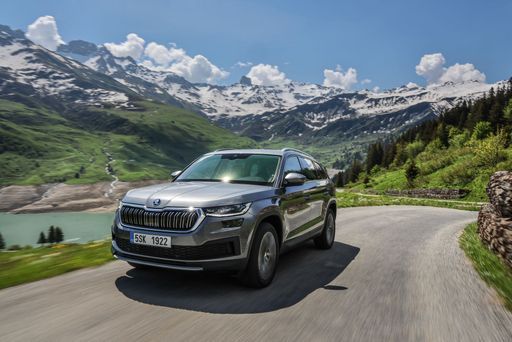 @ Škoda Auto a.s. / Škoda Storyboard
@ Škoda Auto a.s. / Škoda Storyboard
Skoda Kodiaq
Alfa Romeo Junior
The Alfa Romeo Junior captures the essence of Italian design with its sleek lines and compact dimensions, making it an icon of elegance and performance. With a spirited driving experience and a charming retro aesthetic, it appeals to enthusiasts and casual drivers alike. This delightful car embodies the brand's rich heritage while remaining a fun and engaging option for those seeking a unique automotive experience.
details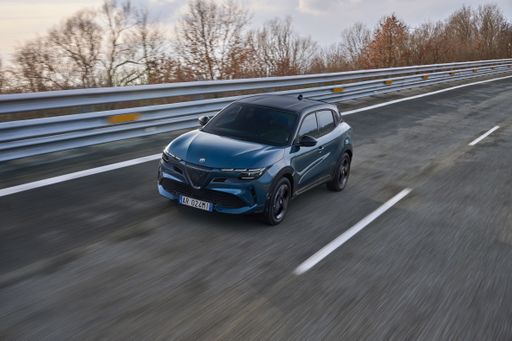 @ Alfa Romeo / Stellantis Media
@ Alfa Romeo / Stellantis Media
 @ Alfa Romeo / Stellantis Media
@ Alfa Romeo / Stellantis Media
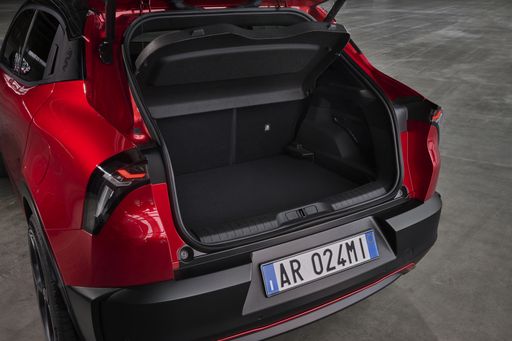 @ Alfa Romeo / Stellantis Media
@ Alfa Romeo / Stellantis Media
Skoda Kodiaq
The Škoda Kodiaq impresses with its spacious interior and sleek design, making it a popular choice for families and adventurers alike. Equipped with a range of modern features, it offers a comfortable driving experience and outstanding versatility. Its robust build and refined handling make it suitable for both urban settings and countryside escapades.
details @ Škoda Auto a.s. / Škoda Storyboard
@ Škoda Auto a.s. / Škoda Storyboard
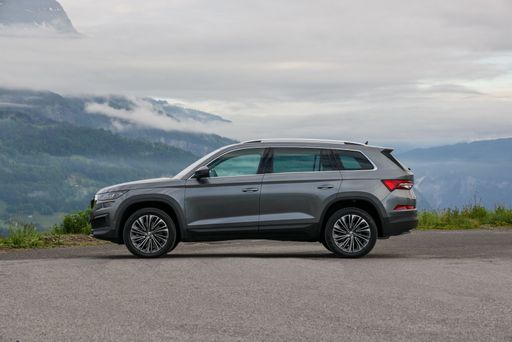 @ Škoda Auto a.s. / Škoda Storyboard
@ Škoda Auto a.s. / Škoda Storyboard
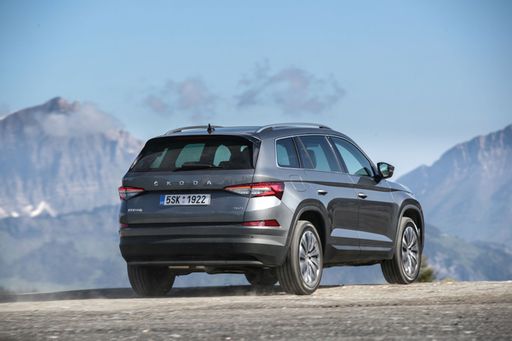 @ Škoda Auto a.s. / Škoda Storyboard
@ Škoda Auto a.s. / Škoda Storyboard
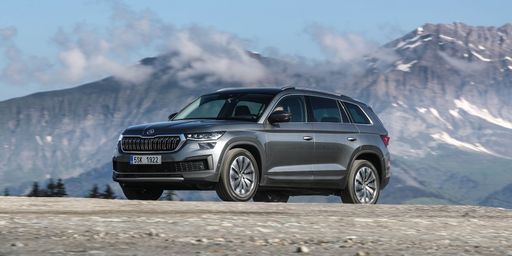 @ Škoda Auto a.s. / Škoda Storyboard
@ Škoda Auto a.s. / Škoda Storyboard
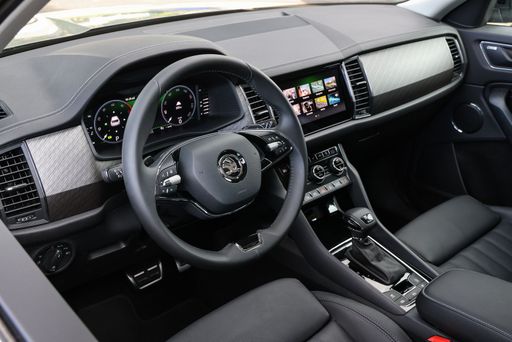 @ Škoda Auto a.s. / Škoda Storyboard
@ Škoda Auto a.s. / Škoda Storyboard
 @ Alfa Romeo / Stellantis Media
@ Alfa Romeo / Stellantis Media
|
 @ Škoda Auto a.s. / Škoda Storyboard
@ Škoda Auto a.s. / Škoda Storyboard
|
|
|
|
Costs and Consumption |
|
|---|---|
|
Price
25700 - 41600 £
|
Price
36800 - 49600 £
|
|
Consumption L/100km
4.8 - 5.4 L
|
Consumption L/100km
0.4 - 8.2 L
|
|
Consumption kWh/100km
15.1 - 17.5 kWh
|
Consumption kWh/100km
-
|
|
Electric Range
344 - 410 km
|
Electric Range
113 - 123 km
|
|
Battery Capacity
0.4 - 51 kWh
|
Battery Capacity
19.70 kWh
|
|
co2
0 - 119 g/km
|
co2
9 - 186 g/km
|
|
Fuel tank capacity
44 - 45 L
|
Fuel tank capacity
45 - 58 L
|
Dimensions and Body |
|
|---|---|
|
Body Type
SUV
|
Body Type
SUV
|
|
Seats
5
|
Seats
5
|
|
Doors
5
|
Doors
5
|
|
Curb weight
1380 - 1689 kg
|
Curb weight
1684 - 1970 kg
|
|
Trunk capacity
340 - 415 L
|
Trunk capacity
745 - 910 L
|
|
Length
4173 mm
|
Length
4758 - 4761 mm
|
|
Width
1781 mm
|
Width
1864 mm
|
|
Height
1505 - 1538 mm
|
Height
1663 - 1683 mm
|
|
Max trunk capacity
1205 - 1280 L
|
Max trunk capacity
1945 - 2105 L
|
|
Payload
390 - 420 kg
|
Payload
460 - 545 kg
|
Engine and Performance |
|
|---|---|
|
Engine Type
Electric, Petrol MHEV
|
Engine Type
Plugin Hybrid, Petrol, Petrol MHEV, Diesel
|
|
Transmission
Automatic
|
Transmission
Automatic
|
|
Transmission Detail
Dual-Clutch Automatic, Reduction Gearbox
|
Transmission Detail
Dual-Clutch Automatic
|
|
Drive Type
Front-Wheel Drive, All-Wheel Drive
|
Drive Type
Front-Wheel Drive, All-Wheel Drive
|
|
Power HP
136 - 280 HP
|
Power HP
150 - 265 HP
|
|
Acceleration 0-100km/h
5.9 - 9.1 s
|
Acceleration 0-100km/h
6.3 - 9.7 s
|
|
Max Speed
150 - 206 km/h
|
Max Speed
205 - 231 km/h
|
|
Torque
230 - 345 Nm
|
Torque
250 - 400 Nm
|
|
Number of Cylinders
3
|
Number of Cylinders
4
|
|
Power kW
100 - 207 kW
|
Power kW
110 - 195 kW
|
|
Engine capacity
1199 cm3
|
Engine capacity
1498 - 1984 cm3
|
General |
|
|---|---|
|
Model Year
2024 - 2025
|
Model Year
2024 - 2025
|
|
CO2 Efficiency Class
A, C, D
|
CO2 Efficiency Class
B, F, G, E
|
|
Brand
Alfa Romeo
|
Brand
Skoda
|
What drive types are available for the Alfa Romeo Junior?
Available configurations include Front-Wheel Drive or All-Wheel Drive.
The prices and data displayed are estimates based on German list prices and may vary by country. This information is not legally binding.
